Intro
Discover the best Irritable Bowel Syndrome diet plan, including trigger foods, gut-friendly nutrition, and digestive health strategies to manage IBS symptoms and improve bowel regularity naturally.
Living with irritable bowel syndrome (IBS) can be challenging, especially when it comes to managing symptoms through diet. IBS is a chronic gastrointestinal disorder that affects millions of people worldwide, causing symptoms such as abdominal pain, bloating, and changes in bowel movements. While there is no cure for IBS, a well-planned diet can help alleviate symptoms and improve overall quality of life. In this article, we will delve into the importance of diet in managing IBS and explore the various dietary approaches that can help mitigate symptoms.
The relationship between diet and IBS is complex, and what works for one person may not work for another. However, research has shown that certain foods and dietary patterns can trigger or exacerbate IBS symptoms. Common trigger foods include gluten, lactose, high-FODMAP foods, and spicy or fatty foods. On the other hand, a diet rich in fiber, fruits, and vegetables can help regulate bowel movements and reduce symptoms. Understanding the role of diet in IBS management is crucial, as it can help individuals make informed food choices and develop a personalized dietary plan.
A well-planned IBS diet can have a significant impact on symptom management. By identifying and avoiding trigger foods, increasing fiber intake, and staying hydrated, individuals with IBS can reduce symptoms such as abdominal pain, bloating, and changes in bowel movements. Additionally, a balanced diet can help promote overall health and well-being, reducing the risk of complications and improving quality of life. In the following sections, we will explore the different aspects of an IBS diet, including the benefits, working mechanisms, and practical tips for implementation.
Understanding IBS and Diet
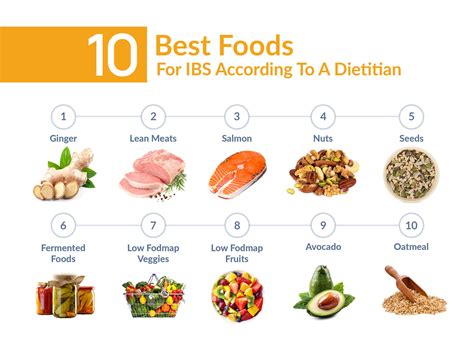
Trigger Foods and IBS
Certain foods can trigger or worsen IBS symptoms, and identifying these trigger foods is crucial for effective management. Common trigger foods include: * Gluten: found in wheat, barley, and rye * Lactose: found in dairy products * High-FODMAP foods: such as beans, cabbage, and broccoli * Spicy or fatty foods: which can irritate the gut and exacerbate symptoms * Artificial sweeteners: such as sorbitol and xylitol * Carbonated drinks: which can cause bloating and discomfortDietary Approaches for IBS Management
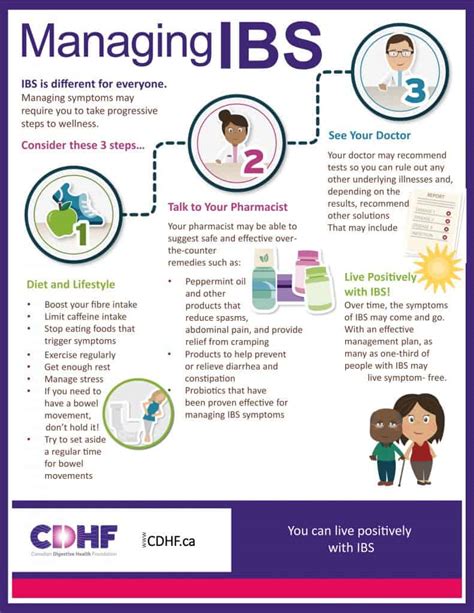
Benefits of a High-Fiber Diet
A high-fiber diet has been shown to have numerous benefits for individuals with IBS, including: * Regulating bowel movements: fiber can help promote regular bowel movements and reduce symptoms of constipation or diarrhea * Reducing symptoms: fiber can help reduce symptoms of abdominal pain, bloating, and gas * Promoting gut health: fiber can help promote the growth of beneficial gut bacteria, which can help alleviate symptomsPractical Tips for Implementing an IBS Diet
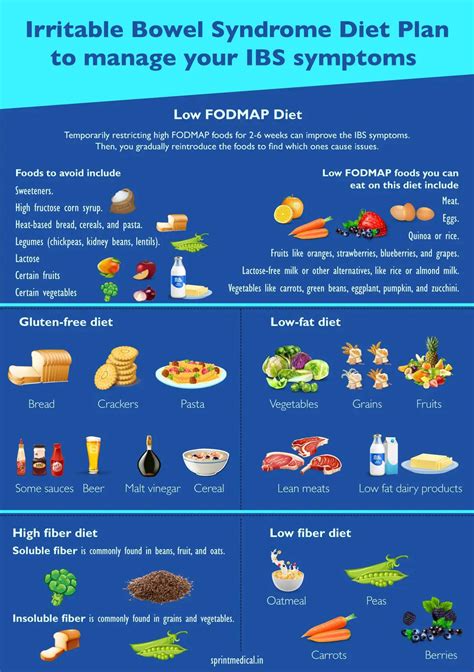
Meal Planning and IBS
Meal planning can be an effective way to manage IBS symptoms, as it allows individuals to plan and prepare meals in advance. Some tips for meal planning include: * Planning meals around low-FODMAP foods: to reduce symptoms of bloating and discomfort * Incorporating high-fiber foods: to help regulate bowel movements and reduce symptoms * Avoiding trigger foods: once identified, avoiding trigger foods can help alleviate symptomsManaging IBS Symptoms with Supplements
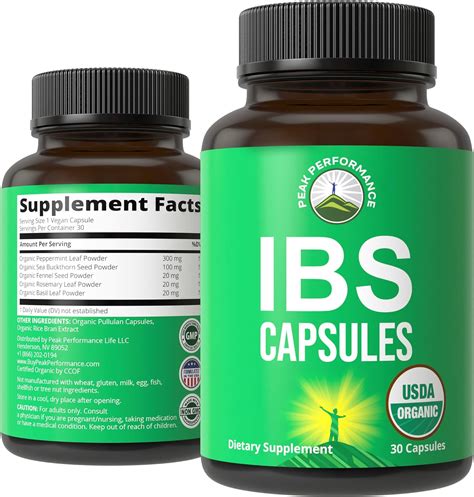
Probiotics and IBS
Probiotics have been shown to be effective in managing IBS symptoms, particularly symptoms of bloating and abdominal pain. Probiotics work by promoting the growth of beneficial gut bacteria, which can help alleviate symptoms. Some tips for using probiotics include: * Choosing a high-quality probiotic: look for a probiotic that contains multiple strains of bacteria * Taking the probiotic regularly: to help promote the growth of beneficial gut bacteria * Combining with other therapies: probiotics can be used in combination with other therapies, such as dietary changes and stress managementStress Management and IBS
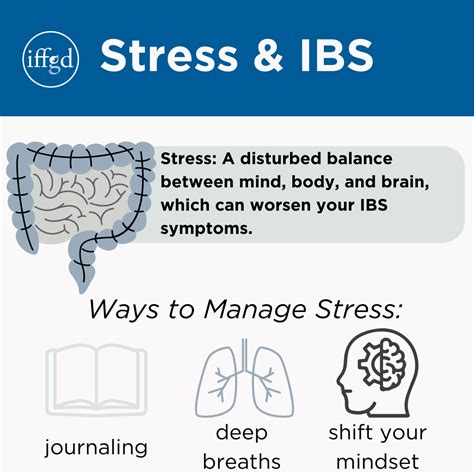
Cognitive-Behavioral Therapy and IBS
Cognitive-behavioral therapy (CBT) has been shown to be effective in managing IBS symptoms, particularly symptoms of anxiety and depression. CBT works by helping individuals identify and change negative thought patterns and behaviors that contribute to symptoms. Some tips for using CBT include: * Working with a therapist: to help identify and change negative thought patterns and behaviors * Practicing relaxation techniques: such as deep breathing and progressive muscle relaxation * Keeping a journal: to track thoughts and feelings and identify patterns and triggersConclusion and Next Steps
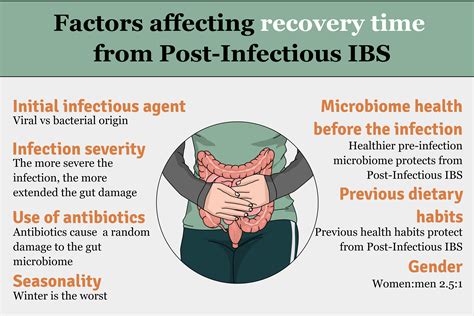
We invite you to share your experiences and tips for managing IBS symptoms in the comments below. Have you found any specific dietary approaches or stress management techniques to be effective in reducing symptoms? Share your story and help others who may be struggling with IBS.
What is the best diet for IBS?
+The best diet for IBS is a personalized diet that takes into account an individual's specific needs and trigger foods. A low-FODMAP diet or high-fiber diet may be beneficial for some individuals, while others may find that a gluten-free or lactose-free diet is more effective.
How can I manage IBS symptoms with stress management techniques?
+Stress management techniques such as meditation, yoga, and deep breathing exercises can be effective in reducing IBS symptoms. These techniques can help reduce stress and anxiety, which can exacerbate symptoms.
Can probiotics help with IBS symptoms?
+Yes, probiotics can be effective in managing IBS symptoms. Probiotics work by promoting the growth of beneficial gut bacteria, which can help alleviate symptoms of bloating, abdominal pain, and changes in bowel movements.
